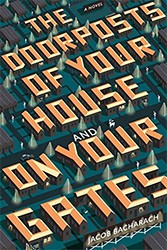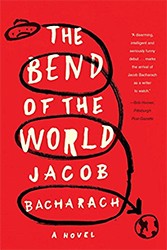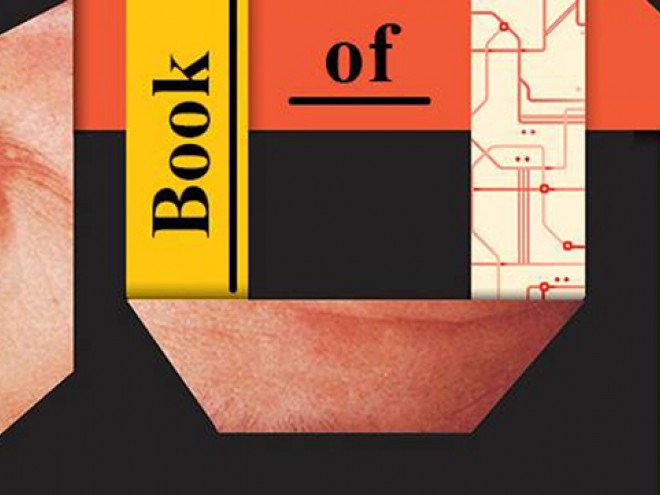
Jacob Bacharach’s second novel sets the story of the biblical Patriarchs and their families in the rust-belt river valleys of western Pennsylvania. With the release of The Doorposts of Your House and on Your Gates this Tuesday, Jacob is guest blogging for the Jewish Book Council all week as part of the Visiting Scribe series here on The ProsenPeople.
Several months after my first novel came out, I made one of the braver decisions of my life and went with my mother to talk about it at her book club. That novel, The Bend of the World, was about aliens, conspiracies, drugs, corporations, and the persistent inability of young men, even as they neared and entered their thirties, to grow up. It was — as its author remains — pretty deeply skeptical that there was even such a thing as growing up. It was full of gay people calling each other “fag,” drunken benders, and a really silly, irresponsible amount of profanity. It was, in other words, an awfully weird book for your mother’s book club.
I’d know many of the women in the group since I was a boy. We’d moved to Uniontown, Pennsylvania, a small town a little more than an hour’s drive southeast of Pittsburgh, when I was in sixth grade, and my parents still lived there at the time. To be back as an adult trying to promote a novel in which flying saucers may be real, fat drug dealers cavort in weird woodland orgies, the best advice comes from a sasquatch, and at least one person commits, or appears to commit suicide, was easily as surreal as the actual contents of the story. Nevertheless, most debut novelist — most novelists, period — are never reviewed in the Sunday New York Times or interviewed on Fresh Air or sent on book tours or lauded with award season praise. You desperately hope to move a few copies of the hardcover, and if your mom’s friends mean ten or twelve sales, then you’d better show up at meeting and sing for your supper.
I don’t suspect that most of them made it all the way through, but it was more fun and less painful than I imagined. There is a certain attitude shared by both the cool literati and the Very Serious Writers gang that ladies’ book clubs are a middlebrow anachronism that only ever want to read historical drams, fizzy divorce stories, and biographies of Eleanor Roosevelt, but it seems to me very close to miraculous that, regardless of tastes, in a society in which even refrigerators have screens and the last hotel I stayed in had a ghostly television hidden away behind the bathroom mirror, ready to bombard you with HBO while you shaved, there remain popular groups of people who not only buy books and read books but gather every few weeks to talk seriously about books. The women, even the ones who gave up on my book after the hundredth “fuck,” were interested, inquisitive, and generous in their questions. They were a hundred times more engaged than any audience of English majors at any college reading I ever gave.
The conversation drifted around to the question of what, if anything, I was working on next. I had just begun to sketch out a new project, what would eventually become my next and forthcoming novel, The Doorposts of Your House and on Your Gates. It didn’t yet have a title, but I knew vaguely that it, like my first novel, would be set in Western Pennsylvania, and I knew that it would somehow parallel or reference the Abraham narratives in Genesis.
Among the women in the book club were a couple of very devout Catholics and at least one devoted Evangelical. I, of course, am Jewish, though far, far away from anything anyone might call believing. I suspect the subject took them a little bit aback, and someone asked me why this, in particular, was of any interest to me. I thought about it, and then I said that I’d been rereading stories from Tanakh — I was fascinated by the very ancient origins of the stories in Genesis and Job — and that what struck me, what interested me, was how thoroughly we misremembered them, how the popular recounting of the stories of Creation and the antediluvian world and the stories of the Patriarchs had flattened them into coherent tales that satisfied quite modern ideas about the shape, texture, and structure of narratives, but that how, when you returned to the original texts (well, the original texts in translation; my Hebrew is, shall we say, less than spotty), what you found was an extraordinary strangeness. The stories are odd, discursive, sometimes highly poetic, often repetitive, sometimes rather shambolic. They self-contradict. There is no psychology. You feel lost in their depths; contradictorily, you feel unable to break the surface. They are, in a word, fascinatingly alien.
Maybe I shouldn’t have used that particular word, given the literal topic of the book that I’d just written and they’d just read; I could see how it sounded, to a certain ear, a little bit like an insult. But it struck me then, as it strikes me now, the closest word to expressing the distance between ourselves and some of our oldest stories, and it seems important to be able to describe why their alienness is so addictive to me.
Jacob Bacharach is the author of the novels The Doorposts of Your House and on Your Gates and The Bend of the World. His writing has appeared in the New Republic, Ha’aretz, the Pittsburgh Post-Gazette, and many others. He lives in Pittsburgh, PA.



